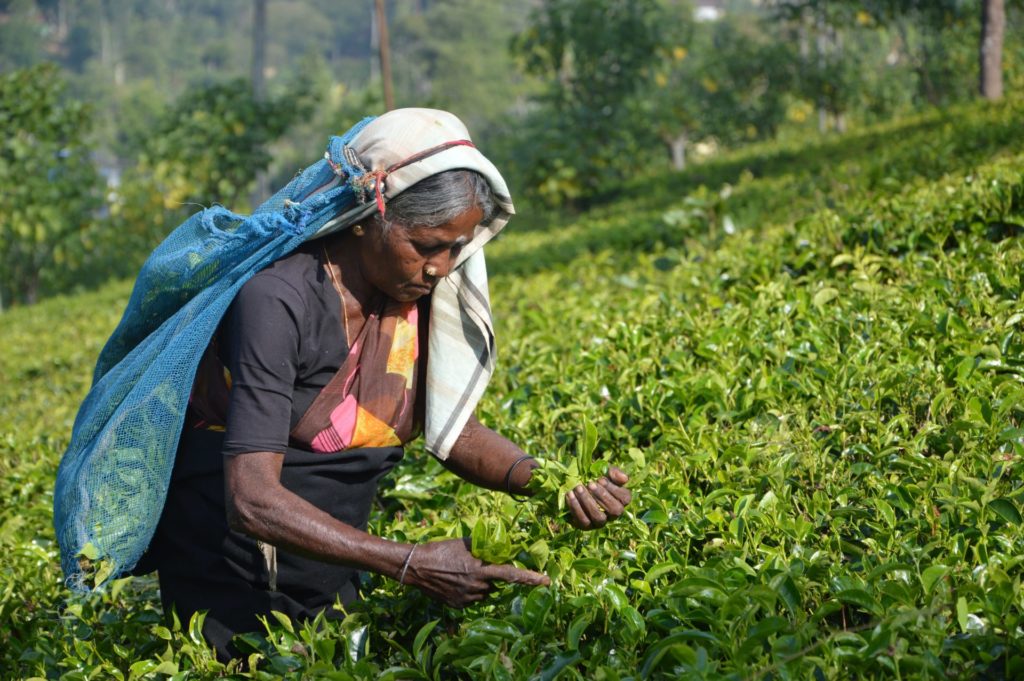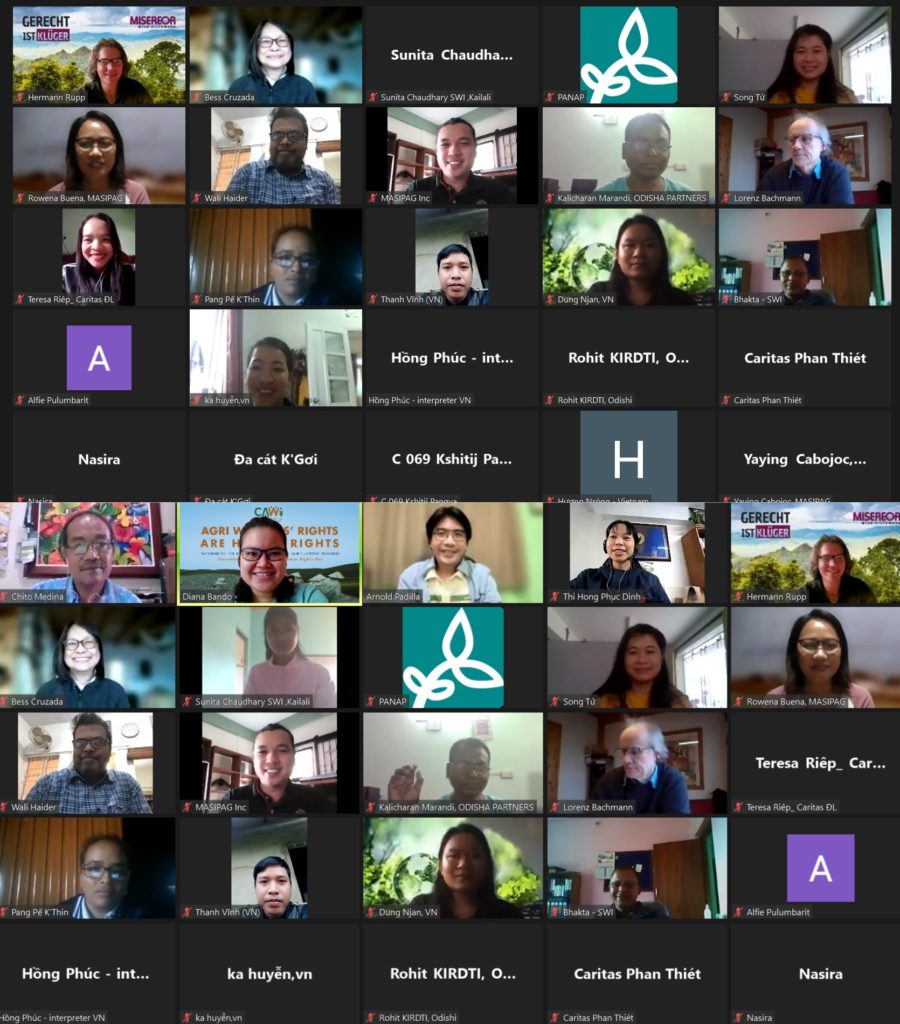
(Sri Lankan woman picks tea leaves, one of the country’s major export products. Photo from: Unsplash)
Sri Lanka recently earned praise for being the first country to become an organic farming nation after President Gotabaya Rajapaksa ordered a total ban on importing agrochemicals in April 2021 and even won the Future Policy Special Award 2021 for its two policies that led to the ban.
However, the country’s shift into organic farming was short-lived. Some farmers resisted the government’s decision to ban agrochemicals. They argued that there would be a decrease in yield and export income without chemical fertilisers or pesticides as tea, rubber, and coconut yields are also expected to drop.
“Prior to the ban, Sri Lanka imported 1,260,000 metric tonnes costing at least USD 277 million (LKR 56 billion) of chemical fertilisers annually that would be distributed among the farmers through the agrarian service centres in the villages as part of the government’s agricultural subsidy to the farmers. And since the country opened its doors to agrochemical importation, farmers have become dependent on these chemicals for their crops,” said Chathu Sewwandi, program coordinator of the Vikalpani National Women’s Federation, during a discussion on Sri Lanka organised by the Asian People’s Exchange on Food Sovereignty and Agroecology (APEX) last December 9.

(Partner organisations of the APEX platform joined the online discussion on Sri Lanka’s transition to organic farming)
APEX held the online meeting as part of a series of discussions to learn from the recent developments and understand the challenges faced by Sri Lanka as it attempts to turn away from pesticides and become sustainable in its agricultural production. Other Sri Lankan groups and agroecology advocates also joined the APEX discussion, including Chaminda Fernando, a national consultant on agriculture development at the United Nations Development Programme (UNDP); Saman Jayakody, director and consultant of the Ecological Farming Training Centre; and Chinthaka Rajapaksha, moderator of the Movement for Land and Agriculture (MONLAR).
According to Sewwandi, the ban is part of the President’s Manifesto, turning Sri Lanka into a ‘green economy’ that would encourage agroecology and farming without using chemical pesticides. President Gotabaya Rajapaksa also cited the health and environmental impacts for the ban on using and importing highly hazardous pesticides (HHPs).
“One of the crucial reasons for banning the importation of agrochemicals was the economic crisis brought by the COVID-19 pandemic and the lack of foreign exchange; therefore, the government has to reduce its expenditure on importation of chemical fertilisers,” Sewwandi added.
Following the ban, the government implemented initiatives to replace chemical fertilisers and pesticides in cultivating crops, such as establishing regional organic fertiliser units, processing garbage to produce organic fertilisers, and giving major organic fertiliser manufacturers incentives.
However, some farmers protested for months due to the drop in crop yields that contributed to the surge in food price inflation.
Sewwandi explained that resistance met the ban on agrochemicals because the government was not fully prepared to respond to the needs of the farmers, and there was no proper infrastructure, system and education to support the farmers’ transition into chemical pesticides-free agriculture. Moreover, the farmers’ lack of technical knowledge on organic inputs and agroecology are also challenges in encouraging them to avoid agrochemicals use on their crops.
The uproar from farmers forced the government to lift the restrictions on the private sector importation of agrochemicals, including herbicides and pesticides, on November 21. But Agriculture Minister Mahidananda Aluthgamage emphasised that there is no change in the government’s pursuit of making Sri Lanka an organic farming nation. The government will continue to provide subsidies, seeds, guaranteed price for paddy, and market access to the farmers, the agriculture official was quoted as saying in news reports.
Meanwhile, Fernando asserted the need for change from the usual “top to bottom approach” to a “bottom-up approach” for Sri Lanka farmers to fully adopt the organic agriculture policy. “From an ecological farmer perspective, the current government policies on agriculture provide limited extension support for farmers like access to markets, technology transfer, value chain development and crop insurance,” the UNDP consultant said.
For Jayakody, who is engaged in enhancing the farmers’ capacity on agroecology and helping them connect to the market, policies intended for food producers must have aspects that would help them link to the market. “When the consumer demand is high, but the farmers face challenges in production volume and product diversity due to the lack of infrastructures and technical assistance, they would not be able to meet the consumers’ demand,” Jayakody said.
Currently, Jayakody and his team are helping farmers’ organisations with the supply chain development for their produce. They developed specific product criteria that farmers need to ensure. They also assist farmers in transporting, handling, branding, packaging and promoting their produce.
Meanwhile, a seldom reported aspect of Sri Lanka’s transition to sustainable agriculture is how agribusinesses are taking over the promotion of organic farming, which is also an opportunity for them to take away the lands from the farmers and turn them into agri-labourers instead. “The government is giving lands to American companies to cultivate aloe vera in an organic manner. There is a risk that the current chemical monoculture will turn into organic monoculture.” Rajapaksha warned.
The MONLAR official added that it is crucial to organise the farming communities to help them understand the impacts of chemical fertilisers and pesticides on their health. The APEX platform could engage at the local and regional level by continuing the discussions about the politics and advantages of agroecology, Rajapaksha pointed out.
PAN Asia Pacific (PANAP) and Magsasaka at Siyentipiko Para sa Pag-Unlad ng Agrikultura (MASIPAG), with support from MISEREOR, are coordinating the APEX Platform, which aims to strengthen the capacities of peoples’ movement in Asia to achieve food sovereignty through agroecology, advance people-led development strategies and approaches, and engage in advocacy for policy reforms and help build peoples’ movements. ###
APEX © Copyrights 2021. All rights reserved.